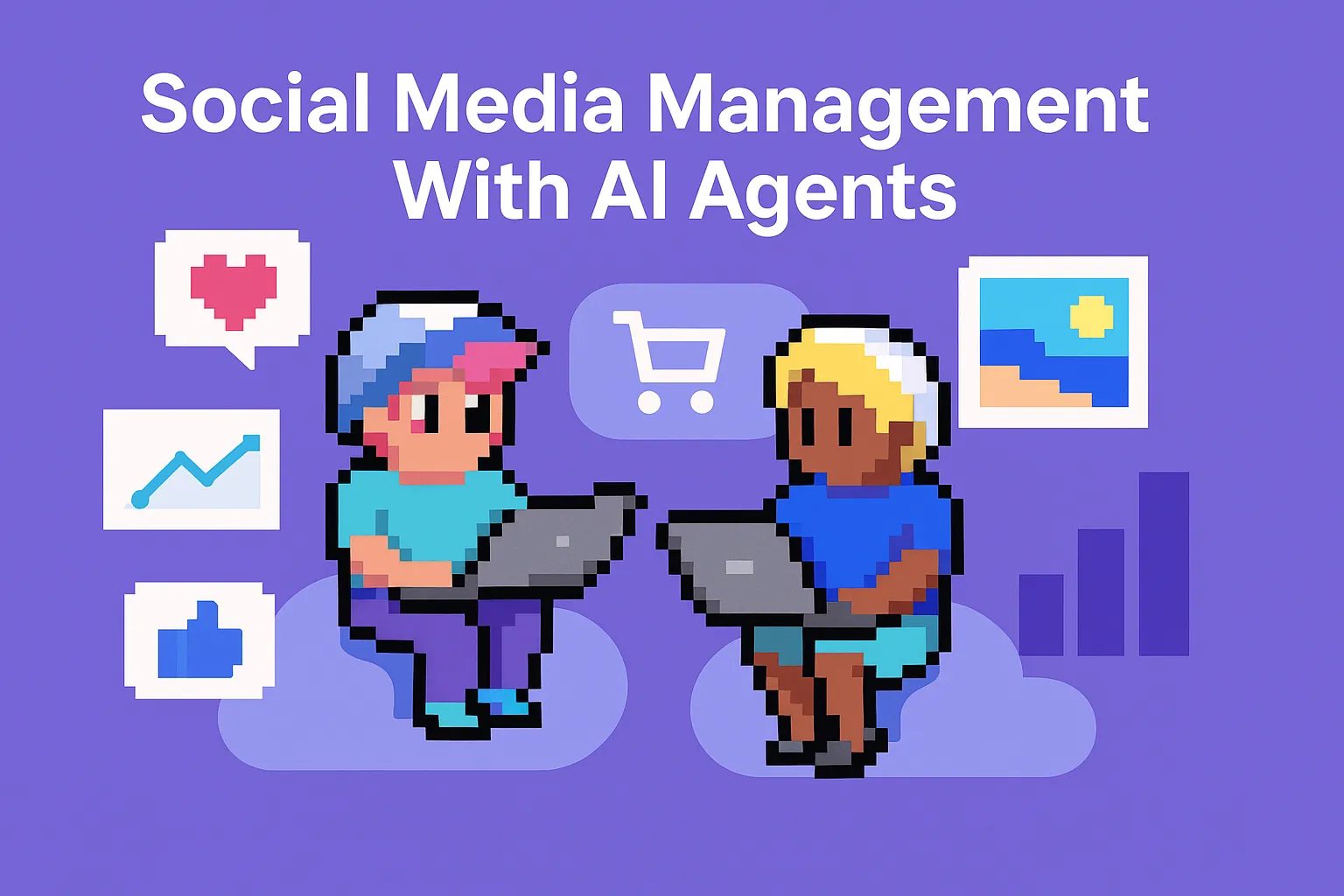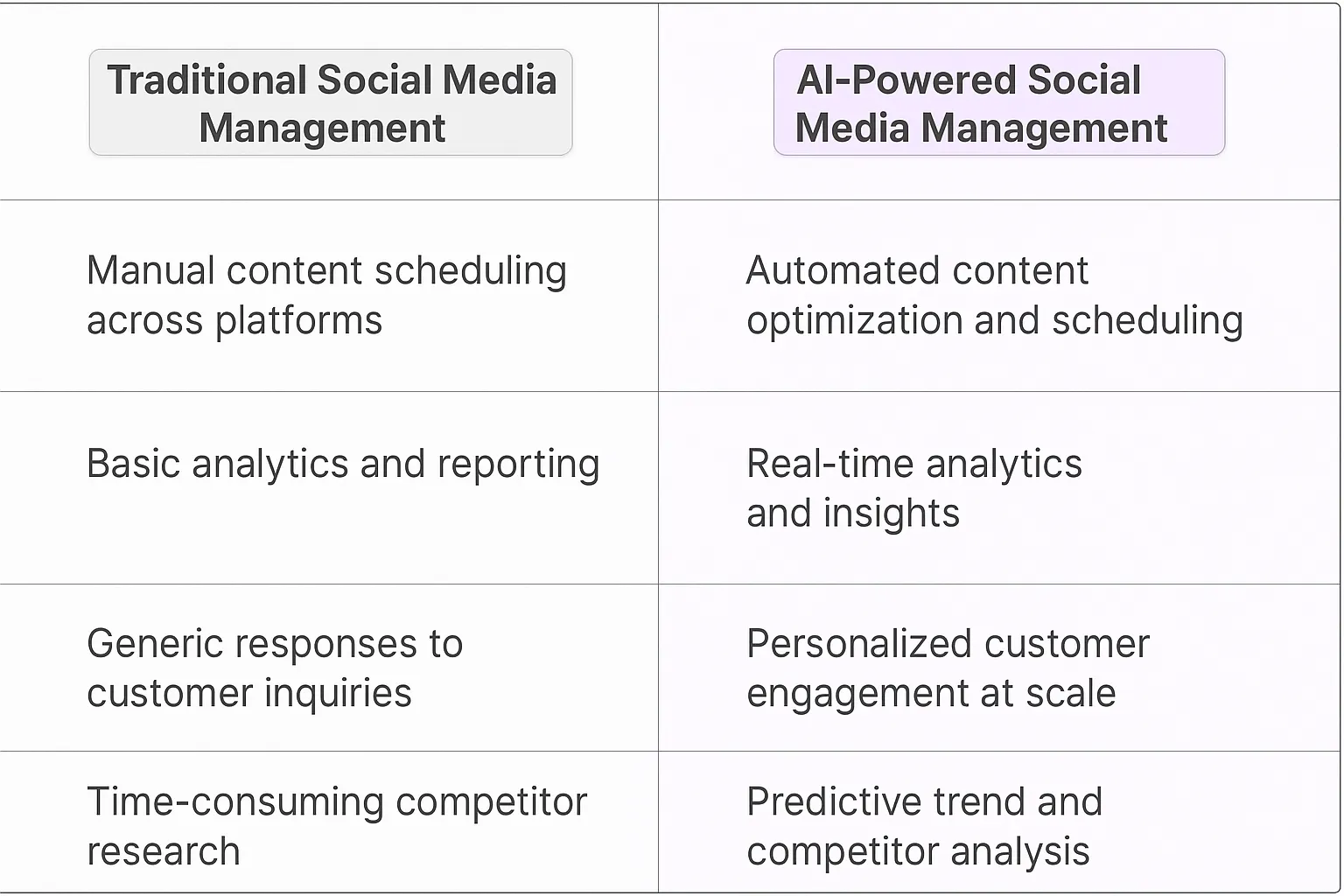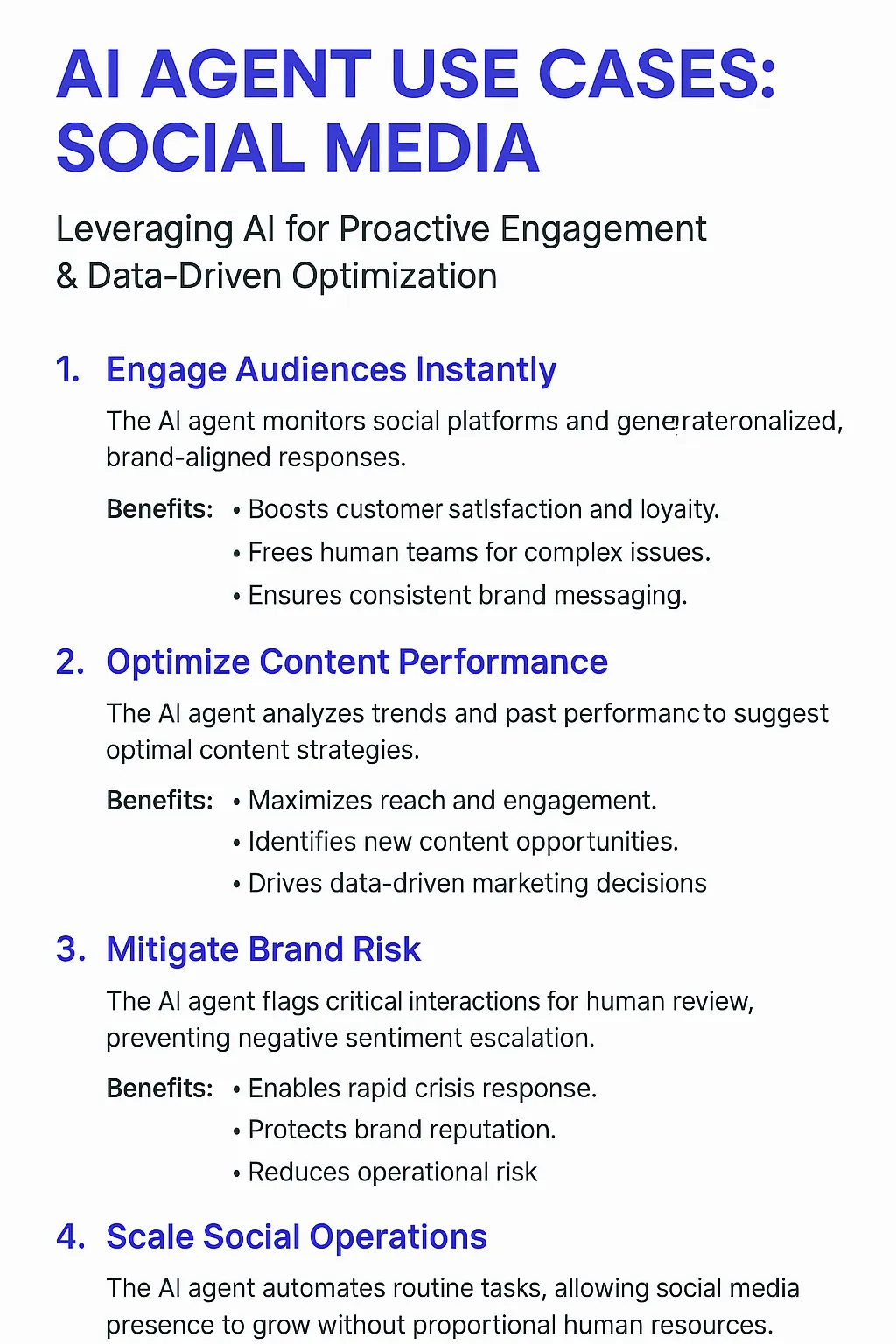Social Media Management AI Agents
The Essence of Social Media Management in the Digital Age
What is Social Media Management?
Social media management is the art and science of creating, scheduling, analyzing, and engaging with content posted on social media platforms. It's a critical component of modern marketing strategies, allowing brands to build relationships with their audience, increase brand awareness, and drive business growth. In today's digital landscape, effective social media management requires a sophisticated blend of creativity, data analysis, and rapid response capabilities.
Key Features of Social Media Management
The core features of social media management include content creation and curation, post scheduling, audience engagement, analytics and reporting, and crisis management. Advanced social media management also incorporates elements like influencer collaboration, paid advertising management, and cross-platform strategy alignment. With the integration of AI agents, these features are being supercharged, allowing for more personalized, data-driven, and efficient social media operations.

Benefits of AI Agents for Social Media Management
What would have been used before AI Agents?
Before AI agents entered the social media management scene, teams relied on a hodgepodge of tools and manual processes. You'd have social media managers frantically juggling multiple platforms, desperately trying to keep up with the never-ending stream of comments, DMs, and mentions. It was like trying to drink from a fire hose while simultaneously juggling flaming torches.
Companies often employed armies of interns or entry-level employees to handle the grunt work of scheduling posts, responding to basic inquiries, and attempting to maintain some semblance of consistency across channels. The result? A lot of wasted time, inconsistent messaging, and missed opportunities for meaningful engagement.
What are the benefits of AI Agents?
Enter AI agents for social media management. These digital teammates are game-changers, and here's why:
1. Superhuman multitasking: AI agents can simultaneously monitor multiple social platforms, tracking mentions, analyzing sentiment analysis, and flagging important interactions. It's like having a team of hyper-focused, never-sleeping social media ninjas at your disposal.
2. Personalization at scale: These agents can learn your brand voice and tailor responses to individual users, creating a sense of personal connection that would be impossible to achieve manually at scale. It's the difference between a generic "Thanks for your feedback!" and a thoughtful response that references the user's specific comment or history with your brand.
3. Predictive content optimization: AI agents can analyze past performance data and current trends to suggest optimal posting times, content types, and even predict which posts are likely to go viral. This isn't just scheduling; it's strategic content deployment backed by data.
4. Crisis management and reputation defense: These digital teammates can detect potential PR issues before they explode, alerting human team members to step in when necessary. They're like an early warning system for your brand's online reputation.
5. Competitive intelligence on steroids: AI agents can continuously monitor competitors' social activities, providing insights into their strategies, content performance, and audience engagement. It's like having a spy network dedicated to social media intelligence.
6. ROI tracking and optimization: By integrating with other business systems, AI agents can track the journey from social interaction to conversion, providing clear ROI data and continuously optimizing for better results.
The bottom line? AI agents for social media management aren't just tools; they're transformative forces that can turn your social media presence from a resource-draining necessity into a powerful, data-driven growth engine. They free up your human team to focus on high-level strategy and creative tasks while ensuring that no opportunity for engagement or insight slips through the cracks.

Potential Use Cases of AI Agents with Social Media Management
Processes
Social media management is a complex beast, and AI agents are stepping up to tame it. These digital teammates can revolutionize how brands interact with their audience, turning the social media landscape into a playground of opportunities.
Content creation becomes a breeze with AI agents. They can analyze trending topics, generate ideas, and even draft posts that capture your brand's voice. It's like having a creative genius on tap, ready to churn out engaging content 24/7.
But it doesn't stop there. AI agents can optimize posting schedules by analyzing user engagement patterns. They'll figure out when your audience is most active and schedule posts accordingly. It's like having a social media crystal ball that predicts the perfect moment to strike.
Tasks
Let's break it down into specific tasks where AI agents shine:
- Hashtag research: AI agents can dig deep into the hashtag universe, uncovering hidden gems that'll boost your post visibility.
- Sentiment analysis: They can sift through comments and mentions, gauging public opinion about your brand in real-time.
- Competitor analysis: AI agents can keep tabs on your rivals, tracking their performance and spotting opportunities for you to outshine them.
- Content curation: They can scour the web for relevant articles, videos, and images that align with your brand, saving you hours of research time.
- Performance tracking: AI agents can crunch the numbers, providing insights on what's working and what's not, helping you refine your strategy on the fly.
The beauty of AI in social media management is its ability to handle the grunt work, freeing up human creativity for high-level strategy. It's not about replacing human intuition, but augmenting it with data-driven insights and automation.
As we move forward, the line between human and AI contributions in social media management will blur. The winners will be those who can effectively orchestrate this human-AI collaboration, creating a social media presence that's both data-smart and authentically human.

Industry Use Cases: AI Agents in Social Media Management
AI agents are reshaping social media management across industries, offering capabilities that go beyond simple automation. These digital teammates are becoming indispensable for businesses looking to elevate their social media game. Let's dive into some specific industry use cases that demonstrate how AI is transforming social media workflows and processes.
From e-commerce to entertainment, AI agents are proving their worth by handling tasks that once required significant human effort. They're not just tools; they're becoming integral team members, capable of understanding context, adapting to brand voices, and even predicting trends. This shift is allowing human marketers to focus on high-level strategy and creative work, while AI handles the heavy lifting of data analysis, content optimization, and engagement management.
As we explore these use cases, you'll see how AI is not just enhancing existing processes but opening up entirely new possibilities in social media management. It's a game-changer that's redefining what's possible in digital marketing and brand communication.
Retail: Elevating Brand Presence with Social Media Management AI
The retail industry is ripe for a social media revolution, and AI agents are the secret sauce. Let's dive into how these digital teammates can transform a clothing brand's online presence.
Picture a trendy streetwear label struggling to keep up with the relentless pace of social media. Enter the social media management AI agent. This isn't your run-of-the-mill scheduling tool; it's a powerhouse of data-driven decision making.
The AI analyzes past performance, identifying which types of content resonate most with the audience. It might discover that behind-the-scenes videos of the design process outperform standard product shots by 3x. Armed with this insight, the AI suggests a content strategy that leans heavily into these authentic, raw glimpses of the brand.
But it doesn't stop there. The AI monitors conversations across platforms, identifying emerging trends and hashtags in real-time. It spots a sudden surge in discussions about sustainable fashion and immediately flags this for the marketing team. Within hours, the brand can pivot, highlighting its eco-friendly practices and tapping into the zeitgeist.
The AI's natural language processing capabilities allow it to craft posts that nail the brand's voice - whether it's snarky, inspirational, or edgy. It can even generate personalized responses to customer comments, fostering a sense of connection that turns casual browsers into loyal brand advocates.
Perhaps most crucially, the AI optimizes posting times based on when the audience is most engaged. It might discover that the brand's Gen Z followers are most active at 11 PM on Tuesdays, a insight that would be near impossible for a human team to uncover manually.
The result? A social media presence that feels authentically human yet operates with machine-like efficiency. The brand sees a 200% increase in engagement, a 50% boost in website traffic from social channels, and a measurable uptick in sales.
This isn't just about posting more or posting better. It's about creating a dynamic, responsive social media ecosystem that turns the brand into a living, breathing entity in the digital world. And that, folks, is how you win the social media game in retail.
Travel Industry: Crafting Unforgettable Experiences with Social Media AI
The travel industry is ripe for disruption, and social media AI agents are the secret weapon. Let's explore how these digital teammates can transform a boutique travel agency's online presence and customer engagement.
Consider a small, adventure-focused travel company that's struggling to cut through the noise on social platforms. They're competing against big-budget airlines and hotel chains, but they've got a unique offering: bespoke, off-the-beaten-path experiences. The challenge? Getting that message to resonate with the right audience.
Enter the social media management AI. This isn't just a glorified post scheduler; it's a strategic partner that's constantly learning and adapting. The AI dives deep into user behavior, identifying micro-segments within the agency's audience. It might discover a subset of followers who engage most with content about sustainable travel in Southeast Asia, or another group that's obsessed with extreme sports in Patagonia.
Armed with these insights, the AI crafts hyper-targeted content strategies. It suggests creating a series of Instagram Stories showcasing hidden eco-lodges in Bali for the sustainability enthusiasts, while recommending TikTok challenges featuring adrenaline-pumping zip-line footage for the adventure seekers.
But here's where it gets really interesting: the AI doesn't just push out content, it fosters genuine conversations. It uses natural language processing to identify and respond to travel queries in real-time. A user comments on a post asking about vegan food options in Tokyo? The AI instantly replies with personalized recommendations, turning a casual interaction into a potential booking.
The AI also taps into the power of user-generated content. It identifies the most compelling traveler photos and stories shared by customers, reaching out for permission to reshare. This not only provides a steady stream of authentic content but also makes customers feel valued and heard.
Perhaps most crucially, the AI optimizes for conversion optimization, not just engagement. It tracks the customer journey from social media interaction to website visit to booking, constantly refining its approach. It might discover that long-form LinkedIn posts about the economic impact of sustainable tourism drive more high-value bookings than flashy Instagram reels.
The results are transformative. The agency sees a 300% increase in social media-driven bookings, a 70% boost in customer engagement, and a 5x increase in user-generated content. But more than that, they've created a vibrant online community of travel enthusiasts who view the agency not just as a service provider, but as a trusted advisor and inspiration source.
This isn't just about posting pretty pictures of beaches and mountains. It's about leveraging AI to create a dynamic, personalized, and conversion-focused social media strategy that turns travel dreams into reality. And that's how a small agency can punch way above its weight in the cutthroat travel industry.
Considerations
Technical Challenges
Implementing a Social Media Management AI Agent isn't just about slapping some machine learning on top of your existing tools. It's a complex beast that requires careful consideration and planning.
First off, you're dealing with a massive firehose of data. Social media platforms generate an insane amount of content every second. Your AI needs to process this torrent in real-time, extracting meaningful insights without drowning in the noise. This requires robust data pipelines and efficient processing algorithms.
Then there's the challenge of natural language processing. Social media is a linguistic wild west. Slang, emojis, memes, and cultural references make understanding context a nightmare. Your AI needs to be fluent in internet-speak across multiple languages and cultures. It's not just about translating words; it's about grasping nuance and sentiment.
Don't forget about the ever-changing landscape of social platforms. APIs change, features come and go, and new platforms emerge. Your AI needs to be adaptable, capable of learning and evolving alongside these shifts. It's a never-ending game of catch-up.
Operational Challenges
On the operational side, things get even trickier. You're essentially asking an AI to be the voice of your brand. That's a big ask, and it comes with significant risks.
Content moderation is a minefield. Your AI needs to distinguish between harmless banter and potential PR disasters. It needs to understand cultural sensitivities and brand values. One misstep, one tone-deaf post, and you're trending for all the wrong reasons.
Then there's the question of authenticity. Social media thrives on genuine human interaction. How do you maintain that authenticity when an AI is managing your presence? It's a delicate balance between efficiency and maintaining a human touch.
Privacy and data security are also major concerns. Your AI will have access to vast amounts of user data. Ensuring this data is handled ethically and securely is crucial. One data breach, and you've lost the trust of your audience.
Finally, there's the challenge of integration. Your social media management doesn't exist in a vacuum. It needs to work seamlessly with your broader marketing strategy, CRM systems, and analytics tools. Getting all these pieces to play nice together is no small feat.
Implementing a Social Media Management AI Agent isn't for the faint of heart. It's a complex undertaking that requires a deep understanding of both technology and human behavior. But for those who can navigate these challenges, the potential rewards are enormous. Just remember, the goal isn't to replace human creativity and judgment, but to augment it. Your AI should be a powerful tool in your arsenal, not a replacement for human insight.
Embracing AI: The Future of Social Media Management
AI agents are not just enhancing social media management; they're fundamentally reshaping it. By automating routine tasks, providing deep insights, and enabling personalization at scale, these digital teammates are allowing brands to create more impactful and authentic social media presences. The examples from retail and travel industries demonstrate the transformative power of AI in crafting engaging content, fostering meaningful interactions, and driving tangible business results.
However, the implementation of AI in social media management isn't without challenges. Technical hurdles like processing vast amounts of data and adapting to ever-changing platforms need to be overcome. Operational concerns around brand voice consistency, content moderation, and data privacy must be carefully addressed.
Despite these challenges, the potential of AI in social media management is undeniable. As these technologies continue to evolve, we can expect even more sophisticated applications that blur the line between human and AI contributions. The future of social media management lies in effectively orchestrating this human-AI collaboration, creating strategies that are both data-smart and authentically human.
For businesses looking to stay ahead in the digital landscape, embracing AI in social media management isn't just an option - it's becoming a necessity. Those who can successfully navigate the challenges and harness the power of these digital teammates will find themselves with a significant competitive advantage in the ever-evolving world of social media.













